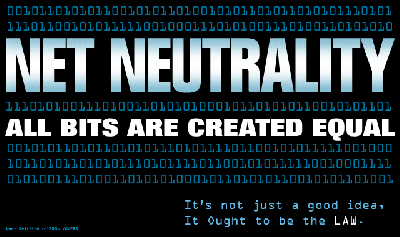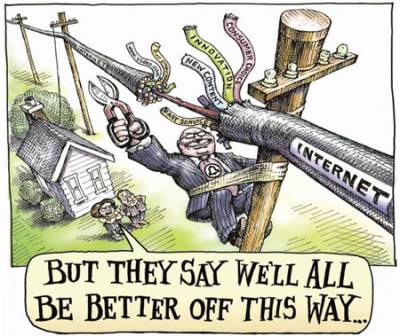 Why people should care about this – and why politicians should not have ears for the industry lobby on this.
Why people should care about this – and why politicians should not have ears for the industry lobby on this.
Net neutrality is one of the topics that pop up so now and then in the news, but don’t really get attention from the broader audience. So again over the last three weeks: on April 3rd the European Parliament (EP) adopted a bill targeting amongst other items roaming charges and net neutrality, on April 22nd the Brazilian Senate adopted a bill called “Marco Civil da Internet” and Thursday the U.S. Federal Communications Commission (FCC) announced that it will allow providers to give paid content priority.
But net neutrality – what does this mean again? And how can the net not be neutral? Net neutrality basically means that a company that is responsible for data transmission to the customer (or involved in this process) is not allowed to distinguish between data based on content, application, originator or receiver. Basically: a provider has to be blind and has to treat all data equal.
The Netherlands adopted already in 2011 a bill guaranteeing net neutrality, surprisingly opposed by the centre-right liberals (VVD). Together with Slovenia it had been the only European country to have done so.
The original bill as proposed by the European Commission (EC) included an option for providers to differentiate between content. It enabled them to charge fees for faster submission of content. A result of thorough work of the lobby groups from the industry. But the EP made some crucial changes to the text as proposed by the EC. The amended bill now allows differentiation only for emergency services and a very limited range of services where fast service without omissions is needed, e.g. surgery where the surgeon is in a different location.
This week Brazil was the next country to adopt legislation around net neutrality. In Brazil they went even further – a full blown Charta of rights has been adopted. With that Brazil has the most modern and complete regulation around civil rights on the net.
But not all developments are that great. On Thursday the FCC announced that it will change regulation to allow providers to move away from net neutrality. Content providers can pay for referent handling of their data so that their content is first delivered to end users. The U.S. will basically get an internet with a two-class-system: first data for companies with enough money to spend will be delivered and whatever is left on bandwidth is for the rest. And in Europe the discussion is not over yet. As the bill still has to be adopted by the member states changes to it are still possible – and the industry lobby will work on this for sure. So that the bill got adopted by the EP is not a guarantee – but it is a big step forward.
 But what is wrong with companies paying for faster delivery? Isn’t it the same as choosing airmail and paying for this instead of the cheaper ground transportation? And what about the often heard argument that it stifles innovation?
But what is wrong with companies paying for faster delivery? Isn’t it the same as choosing airmail and paying for this instead of the cheaper ground transportation? And what about the often heard argument that it stifles innovation?
Well – of course it’s perfectly fine if you chose yourself to pay more for faster delivery. You can already do so – by choosing e.g. for 4G or a subscription with higher guaranteed speed. And other options are thinkable – e.g. a subscriptions targeting specifically people that want high quality streaming. But leaving this to content providers and network providers leaves you out of the equation. They decide for you what content is delivered fast and what content is not. Companies with enough money to spend can make their content preferred – and whatever bandwidth is left has to be shared amongst the rest.
Does is stifle innovation then? The contrary is true. A net were money buys priority delivery will make it harder for start-ups. But innovation usually comes from start-ups, and not from companies with big pockets, they’ll only buy the innovative start-up at some point. Just look at the apps you use the most – which one has not been developed by a start-up and needs some years to generate profit? They couldn’t have afforded to buy bandwidth – and this could have potentially impacted their breakthrough.
But what about the principle that the government should not interfere with how companies make money? Network providers already have enough options to differentiate in their pricing plans. They get also already paid for data usage, so this is also not an argument. This is different for content providers. It could be argued that you want to differentiate based on quality – e.g. high resolution and uninterrupted streaming. The problem here is that data lines and bandwidth are limited. So there is an inherent danger that bigger companies can block out competition. As with other infrastructure as well usage has to be regulated to ensure free competition.
The network providers have to get used to that there industry is changing. The digital highway is more becoming a mix between a commons and a good. Usage of the net is moving towards becoming a necessity for people, it might even become a right in itself at some point. Using legislation to build walls around it to delay the change of the industry is not the right way and should be fiercely opposed us all.